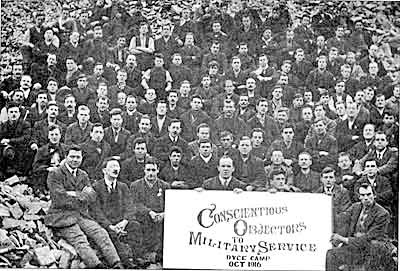Speaker : Sue Smith, who has studied the subject in depth at Oxford University.
There were about 100 Conscientious Objectors (COs) in Oxford during the War, but many of the records have been destroyed. In the early part of the War the Armed Services used regular forces, but by 1916 we could no longer replace troops in sufficient numbers, so universal conscription was introduced. Everyone eligible was ‘deemed to be enlisted’. This meant that those who could not, or would not, join the Armed Forces were subject to a Military Tribunal which examined their case and delivered a verdict. Certain categories (eg those in nationally important employment, or who were ill) were able to get exemption. But those who objected to military service on ethical grounds had a much more difficult time.
The Tribunals usually consisted of men who were established local figures, and not likely to share such views. They also had a representative of the Military, who exerted an influence on them. In any case COs, among the general public, were suspected of cowardice or unmanliness, and often abused. In reality, COs, and in particular Quakers, often served as medics and ambulance men in very dangerous circumstances on the front line.
Altogether in the country during the war there were about 18,000 COs, who objected to service either because of religious objections to killing, or who objected on political grounds to the War. 6,000 of these were sent to prison. Conditions were often harsh. Many COs were sent to the notorious Dartmoor prison, and we were shown pictures of a large group of COs there.
The Oxford COs were a mixture, and came from all classes. Some COs, after the War, became well-known figures especially if they were from the upper class. Raymond Postgate, who later founded the Good Food Guide, spent time in prison, but was driven by taxi to jail. Another CO, a Quaker (Sydney Langford Jones), was a painter and sculptor, and made figures during his detention out of porridge oats. Alan Kay was of German descent, and a CO, and committed suicide in 1919.
The COs were not without sympathetic support. In and around Oxford there were the Morrells in Garsington, who provided a refuge, the Bishop of Oxford who forced a debate in the House of Lords, the Professor of Greek Gilbert Murray and many Quakers, some from influential families. Though the antagonism to them lasted for several years after the War (they were not allowed to vote until 1926), they led eventually to legislation (first in Britain, then spreading to many other countries) that guaranteed the right of COs to refuse to join the Armed Forces.
The talk was followed by a very rewarding discussion.

